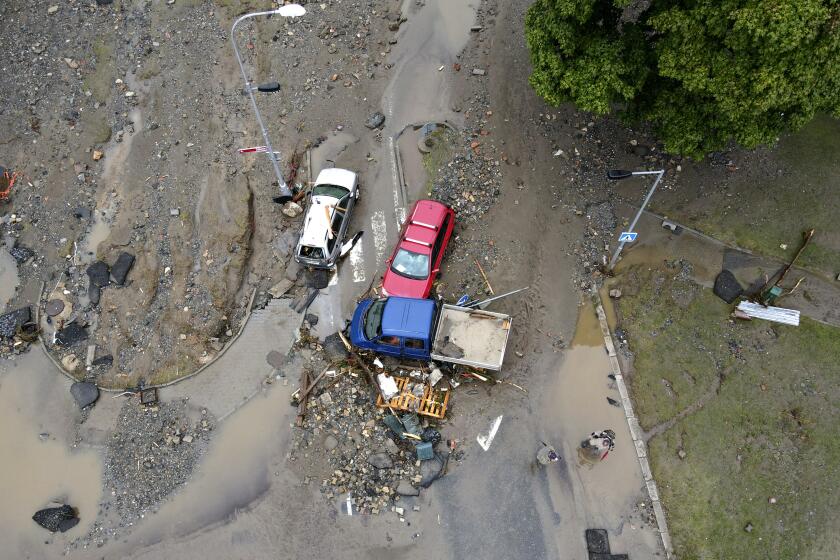Security Council Vote Is Unanimous on Sanctions
The U.N. Security Council voted unanimously Saturday to impose sanctions on North Korea that are meant to cut off the materials and funding for its nuclear program, although China ruled out participating in inspections of North Korean cargo.
As a result of what Russia’s ambassador called “tense negotiations,” the resolution does not allow military enforcement of the sanctions and makes it clear that the restrictions will be lifted once North Korea abandons its nuclear program and returns to talks. It also contains exemptions to the sanctions to minimize the effect on civilians.
The decision by all 15 members to punish North Korea while leaving the diplomatic door open was a hard-fought act of unity in the wake of the reclusive regime’s defiant Oct. 9 announcement that it had conducted a nuclear test, days after the Security Council warned of “serious consequences.”
“The Security Council has adopted one of the most important decisions in recent times on an issue of great concern to the international community, that of nonproliferation,” Japanese Ambassador Kenzo Oshima said after the vote.
To prevent North Korea from acquiring or exporting nuclear materials, the resolution calls for a ban on goods related to the nation’s weapons programs and a freeze on financial activities that support them, as well as a travel ban for senior North Korean officials. It also would put an embargo on heavy conventional weapons and luxury goods.
But China said Saturday that it would not participate in a key measure that would allow the inspection and seizure of suspected nuclear and missile materials going in and out of North Korea. At China’s insistence, the final text was diluted to merely request, rather than require, that countries aggressively inspect North Korean cargo.
“China will implement this resolution, but it will not participate in those inspections,” Chinese Ambassador Wang Guangya said. “We strongly urge those who think it is necessary to do it with caution, because it could easily lead by one side or the other to a provocation of conflict. That would have serious implications for the region.”
China’s reluctance to take part in inspections of North Korean cargo throws into doubt how effective the sanctions will be. China is North Korea’s neighbor and provides about 70% of its oil and 40% of its food. Beijing doesn’t want the sanctions to cause the unstable regime in Pyongyang to collapse, sending refugees flooding across the border into China.
U.S. Secretary of State Condoleezza Rice is heading to Beijing, Seoul and Tokyo this week to talk about how to enforce the resolution, and additional measures that the countries can take to contain North Korea.
The inspection measure is based on the 2003 U.S.-led Proliferation Security Initiative, or PSI, involving a group of 16 core countries that have agreed to take steps to stop the flow of weapons of mass destruction, including boarding ships for inspections.
U.S. officials portrayed the unanimous vote as a political victory for the United States in bringing together countries that had been reluctant to take a hard line on North Korea -- in particular, China and Russia.
U.S. Ambassador John R. Bolton had pushed hard for a swift and tough resolution after North Korea’s missile tests in July and after the declared nuclear test last week, and even managed to get the PSI measure in the resolution.
President Bush described the Security Council resolution as a “clear message” to North Korean leader Kim Jong Il that “the world is united in our opposition to his nuclear weapons plans.”
In brief remarks on the South Lawn of the White House, Bush also pledged to help North Korea with its economic recovery if it gave up its nuclear weapons program. “This action by the United Nations, which was swift and tough, says that we are united in our determination to see to it that the Korea Peninsula is nuclear-weapons-free,” he said.
The North Korean ambassador, Pak Gil Yon, told the council that his country “totally rejects the unjustifiable resolution” and denounced the “gangster-like” behavior of the Security Council for sanctioning North Korea without addressing the threat that it felt the U.S. posed to his country.
North Korea would not “possess even a single nuke when it is no longer exposed to the U.S. threat,” Pak said, but if sanctions are imposed it will “continue to take physical countermeasures, considering it as a declaration of war.”
Pak then walked out of the chamber, leading Bolton to suggest to the council that North Korea should be expelled from the United Nations.
*
Times staff writer Maura Reynolds in Washington contributed to this report.
More to Read
Sign up for Essential California
The most important California stories and recommendations in your inbox every morning.
You may occasionally receive promotional content from the Los Angeles Times.










